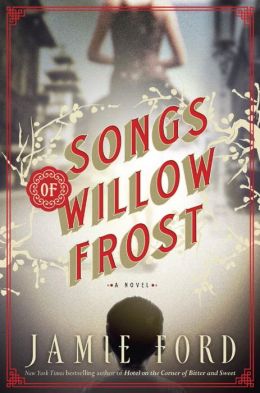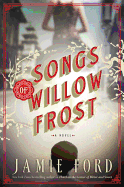 Jamie Ford's Songs of Willow Frost is a tender, deeply felt novel set in Seattle during the 1920s and the subsequent Great Depression. Twelve-year-old William Eng knows he has not always lived at Sacred Heart Orphanage, because he remembers a mother who loved him. Since the orphanage withholds information about the parents of its residents, though, William does not know why his mother gave him up. On their assigned communal birthday, the orphans take a field trip to the movies, and William can't believe his eyes when Willow Frost appears onscreen. He's certain the actress is his long-absent mother, Liu Song, whose name translates to "willow" in English.
Jamie Ford's Songs of Willow Frost is a tender, deeply felt novel set in Seattle during the 1920s and the subsequent Great Depression. Twelve-year-old William Eng knows he has not always lived at Sacred Heart Orphanage, because he remembers a mother who loved him. Since the orphanage withholds information about the parents of its residents, though, William does not know why his mother gave him up. On their assigned communal birthday, the orphans take a field trip to the movies, and William can't believe his eyes when Willow Frost appears onscreen. He's certain the actress is his long-absent mother, Liu Song, whose name translates to "willow" in English.
When he learns Willow Frost will be performing in Seattle, William longs to go to her, but running away from the orphanage is difficult. His best friend Charlotte, who is blind but sees the reality of their situation, aids him. No white couple wants to adopt a Chinese boy like William, and Charlotte has her own family demons to flee. Together, the children brave the sad and dangerous streets of Depression-era Seattle, but when William comes face-to-face with Willow, he learns her past--and his own--are far more complicated than a simple question of love.
Interwoven with William's story is that of his mother, Liu Song, a beautiful young girl whose mother's death leaves her at the mercy of a cruel stepfather and his coarse wife. The unexpected friendship of a handsome Chinese man who understudied her father in the Peking opera inspires Liu Song to dream of a better future, but the realities of her situation as an unwed Asian mother in the 1920s hinder her progress.
As in his debut novel, Hotel on the Corner of Bitter and Sweet, Ford explores the effects of separation and the hope for reunion that keeps parted souls struggling on in life. He shows readers a time of poverty and sacrifice in the U.S., when children ended up in orphanages because their parents had to choose between giving them up or watching them starve to death, and a time of prejudice against women and minorities. Despite the harsh historical realities, though, the story ultimately yields redemption, hope and plentiful fodder for book club conversations. Ford's fans will fall in love all over again, and new readers are sure to find much to enjoy. --Jaclyn Fulwood
Shelf Talker: The story of a Chinese boy who believes he has found his long-lost mother is sure to be another book club hit.
 "Bookstores are for browsing, but they should also be showrooms in which the selection on hand is backed up by the vast catalog and data bases of books that can be ordered. No customer should ever leave a store having asked for a book that can be located somewhere without closing the sale. I once saw a relevant sign in a hotel in Egypt of all places that today's booksellers should adopt: 'The answer is yes; there is no other answer.' The best bookstores--as Joyce Meskis [owner of Tattered Cover Book Store and director of the University of Denver's Publishing Institute] has helped to teach us--become community destinations featuring an array of additional attractions such as reading groups and writing classes. The appeal of spending time with other readers is considerable. Bookstores are clubs, open to all with common ideals and interests. (It helps, of course, to have a coffee shop or cozy lounging areas.).... So, the roles of the publisher and the booksellers remain essential to the process."
"Bookstores are for browsing, but they should also be showrooms in which the selection on hand is backed up by the vast catalog and data bases of books that can be ordered. No customer should ever leave a store having asked for a book that can be located somewhere without closing the sale. I once saw a relevant sign in a hotel in Egypt of all places that today's booksellers should adopt: 'The answer is yes; there is no other answer.' The best bookstores--as Joyce Meskis [owner of Tattered Cover Book Store and director of the University of Denver's Publishing Institute] has helped to teach us--become community destinations featuring an array of additional attractions such as reading groups and writing classes. The appeal of spending time with other readers is considerable. Bookstores are clubs, open to all with common ideals and interests. (It helps, of course, to have a coffee shop or cozy lounging areas.).... So, the roles of the publisher and the booksellers remain essential to the process."


SHELFAWARENESS.1222.S1.BESTADSWEBINAR.gif)


SHELFAWARENESS.1222.T1.BESTADSWEBINAR.gif)

 Good news from Washington Heights in northern Manhattan:
Good news from Washington Heights in northern Manhattan:  U.K. bookshop chain Foyles will
U.K. bookshop chain Foyles will 
 Beginning next month,
Beginning next month,  Boxer Mike Tyson joined sports reporter George Willis (r.) at Bounce Sporting Club in New York City last week for an event to promote Willis's The Bite Fight: Tyson, Holyfield, and the Night That Changed Boxing Forever (Triumph Books).
Boxer Mike Tyson joined sports reporter George Willis (r.) at Bounce Sporting Club in New York City last week for an event to promote Willis's The Bite Fight: Tyson, Holyfield, and the Night That Changed Boxing Forever (Triumph Books). Our favorite
Our favorite 
 When visiting Grand Cayman, travelers were advised by the Washington Times to seek out Camana Bay, where the "vibe is Menlo Park, California meets Caribbean island" and they "can mingle easily with locals, rather than been relegated to a tourists-only zone." Among the highlights mentioned was
When visiting Grand Cayman, travelers were advised by the Washington Times to seek out Camana Bay, where the "vibe is Menlo Park, California meets Caribbean island" and they "can mingle easily with locals, rather than been relegated to a tourists-only zone." Among the highlights mentioned was  Chronic Resilience: 10 Sanity-Saving Strategies for Women Coping with the Stress of Illness
Chronic Resilience: 10 Sanity-Saving Strategies for Women Coping with the Stress of Illness Jamie Ford's Songs of Willow Frost is a tender, deeply felt novel set in Seattle during the 1920s and the subsequent Great Depression. Twelve-year-old William Eng knows he has not always lived at Sacred Heart Orphanage, because he remembers a mother who loved him. Since the orphanage withholds information about the parents of its residents, though, William does not know why his mother gave him up. On their assigned communal birthday, the orphans take a field trip to the movies, and William can't believe his eyes when Willow Frost appears onscreen. He's certain the actress is his long-absent mother, Liu Song, whose name translates to "willow" in English.
Jamie Ford's Songs of Willow Frost is a tender, deeply felt novel set in Seattle during the 1920s and the subsequent Great Depression. Twelve-year-old William Eng knows he has not always lived at Sacred Heart Orphanage, because he remembers a mother who loved him. Since the orphanage withholds information about the parents of its residents, though, William does not know why his mother gave him up. On their assigned communal birthday, the orphans take a field trip to the movies, and William can't believe his eyes when Willow Frost appears onscreen. He's certain the actress is his long-absent mother, Liu Song, whose name translates to "willow" in English.